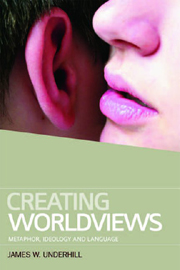Book contents
A Final Word
from Part II - Case Studies in Metaphor
Published online by Cambridge University Press: 12 September 2012
Summary
At the end of this tour of worldviews, what are we to conclude? Ultimately, this will depend, to a large extent, upon our own worldview. The pessimist and the fatalist will conclude that ideology and cultural mindsets are inescapable. From such a perspective, a worldview appears as a confining space, a prison. And, indeed, it seems true that in thinking and in expression, metaphor (one constitutive element of all worldviews) is ubiquitous and inescapable. The social sciences, with their objectifying rhetoric and, not least of all, their conception of the relationship between society and individuals (the ‘products of social processes’), tend to push us towards a fatalism in which we conceive ourselves as the passive (and innocent) ‘victims’ of ‘inhuman’ ideology. This seems to be reductive. And it also invites us to side-step the moral question of human responsibility in society, culture and, by extension, language. That Klemperer and Fidelius refused to accept such linguistic complacency should suffice to contradict such an interpretation of the way language affects us.
Fatalism is entirely foreign to Humboldt's project, the attempt to understand and compare the characters of languages and the worldviews that each one opens up to its speakers. Fatalism fails to understand the efforts of the engaged writer who seeks to resist the reigning ideology. Klemperer, Orwell and Kundera become incomprehensible from such a perspective.
- Type
- Chapter
- Information
- Creating WorldviewsMetaphor Ideology and Language, pp. 236 - 240Publisher: Edinburgh University PressPrint publication year: 2011

